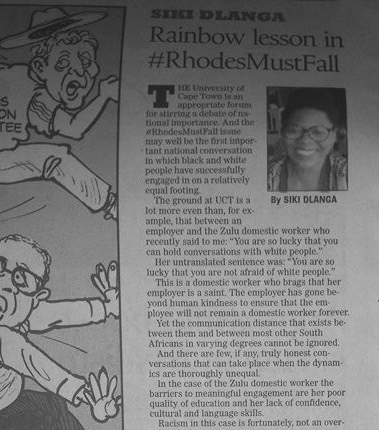
THE University of Cape Town is an appropriate forum for stirring a debate of national importance. And the #RhodesMustFall issue may well be the first important national conversation in which black and white people have successfully engaged in on a relatively equal footing.
The ground at UCT is a lot more even than, for example, that between an employer and the Zulu domestic worker who recently said to me: “You are so lucky that you can hold conversations with white people.”
Her untranslated sentence was: “You are so lucky that you are not afraid of white people.”
This is a domestic worker who brags that her employer is a saint. The employer has gone beyond human kindness to ensure that the employee will not remain a domestic worker forever.
Yet the communication distance that exists between them and between most other South Africans in varying degrees cannot be ignored.
And there are few, if any, truly honest conversations that can take place when the dynamics are thoroughly unequal.
In the case of the Zulu domestic worker the barriers to meaningful engagement are her poor quality of education and her lack of confidence, cultural and language skills.
Racism in this case is fortunately, not an overriding factor.
I am learning that the disconnectedness in our country between black and white people is largely because our lives have been lived in largely separate worlds.
Even communicating using the same language can be frustrating. The intended meaning is often lost as it reaches the deafened ear of a listener, whose ear is trained to only understand his or her world and nothing further.
This listener is ever ready with a seemingly rehearsed response without ever trying to sit on the other side to hear the argument from there.
And in such a case no one is heard. No one understands. In that frustration racism is the default response.
Many black UCT students are likely to have spent their lives in schools and universities that groom them to be eloquent in English and expose them to that worldview. Very few white people have had the opposite kind of education experience.
In this sense the conversation is unequal.
For me, the conversation has also highlighted a laziness about trying to understand another person’s world or experience. One person dismisses another person’s point of view without a thought because this is quick and easy.
The presumption is that only one worldview is acceptable or correct.
But such kneejerk responses trap people into monotonous mindsets that deprive nations of the wealth and potential offered by their diversity.
And there is no escaping it, we are diverse. We are Archbishop Desmond Tutu’s “rainbow nation”. And a rainbow is a harmonious blend of contradicting colours. In it the colour orange can never insist that violet is wrong, or does not belong.
I am of the view that South Africa has a wealth of perspectives and that our nation must learn to be at ease with these. We can only begin to value these diverse perspectives if we choose to understand them. And if we understand them, we may find that we love the full spectrum of the rainbow, not just the perspective we have been exposed to.
This understanding can only be authentically achieved if we deliberately immerse ourselves in a different world to the one we are accustomed to.

Nice on Siki. Keep on
love brett fish
thank you Brett. God bless.
In fact, i wrote this the other day plus the poem that preceded it to ask the question of why are white people in particular so bad at listening, almost as if they are scared of listening and so a topic like ‘white privilege’ comes up and they either have a knee-jerk response or they head for the hills – https://brettfish.wordpress.com/2015/04/01/a-south-africa-i-dream-of
Good hard uncomfortable listening and wrestling is a necessary place to start although your piece brought up the truth i hadn’t considered about the lack of balance that is in place when the conversation has to happen in my language because i haven’t bothered/gotten around to/made the effort to learn yours… that is a huge one…
thanks
love b
Thank you Siki.
pleasure Cara.
Siki, I found your blog through SheLoves. I’m in Canada (near Vancouver) and can’t help but think about the unequal conversations here. Thank you for your beautiful, provocative words.
How interesting. I can’t imagine what kind of conversations you may be having. I am happy that the conversation was able to stimulate thought for your conversation though I am quite unfamiliar with unequality in Canada.
As always… a worthy read! Well done Siki, insightful and engaging!